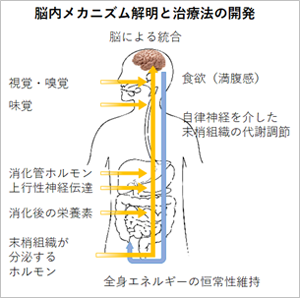スタッフ
| 准教授 | 戸田 知得 toda-c(アットマーク)kumamoto-u.ac.jp |
|---|---|
| 助教 | 阿部 嵩志 t_abe(アットマーク)kumamoto-u.ac.jp |
研究テーマ
【研究プロジェクト名および概要】
脳には体内のエネルギー量を一定に保つ働きがある。体重コントロールでは食欲と熱産生などのエネルギー消費量のバランスを脳が決定しているため、数日で体重が5キロ以上増減することはほとんどない。血糖値についても同様で、脳内のグルコースセンシング神経が血糖値の増減をモニターしており、肝臓からの糖産生および筋肉などでの糖取り込みを調節して血糖値が正常範囲内になるよう制御している。末梢組織から分泌されるホルモン、血中栄養素の濃度変化、迷走神経などの上行性神経伝達など全ての情報が脳内で統合され、このような精密な制御を行っている。しかし、脳内の恒常性維持機構に異常があると肥満や糖尿病の発症につながる。我々の研究室では、これらの脳内メカニズムや神経回路、そして破綻メカニズムについて基礎研究を行い、新しい糖尿病治療法の開発を目指している。
The brain plays an important role in maintaining energy homeostasis in the body. For body weight control, the brain determines the balance between appetite and energy expenditure such as heat production, so it is not usual to increase or decrease body weight by more than 5 kg in a few days. The same is true for blood glucose levels. Sensors in the brain called glucose-sensing neurons monitor an increase and decrease in blood glucose levels and regulate glucose production from the liver and glucose uptake in muscles to keep blood glucose levels within normal ranges. Hormones secreted from peripheral tissues, changes in the concentration of nutrients in the blood, and ascending neurotransmissions such as the vagus nerve are all integrated with the brain to achieve this precise control. However, abnormalities in the homeostatic system in the brain lead to the development of obesity and diabetes. Our laboratory is conducting basic research on these brain mechanisms, neural circuits, and mechanisms of disruption, to develop new therapy for diabetes.


